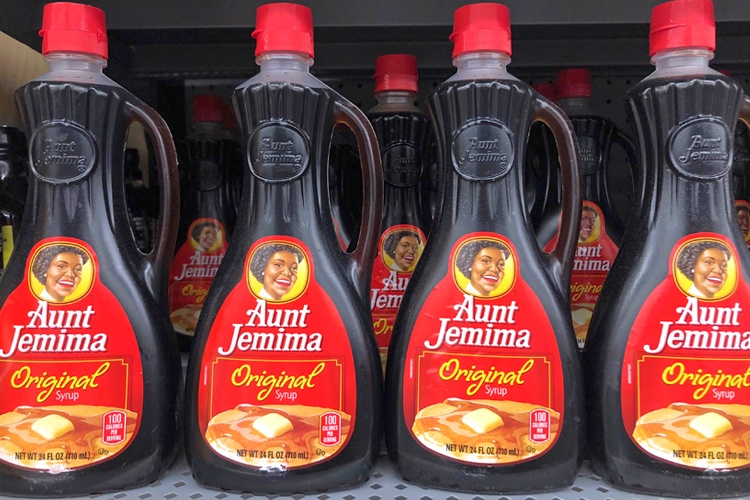In 2020, the company behind Aunt Jemima announced it was changing the name of the famous baking mix. For many people, it was long past time. For years, Aunt Jemima has been criticized by many as a racist, insensitive spokesperson.
The image of Aunt Jemima depicted on the box has changed several times, and it inspired similar depictions in Hollywood and on TV. She also changed trademark law and created the so-called Aunt Jemima Doctrine. Here’s the history behind the smiling face on the pancake mix box.

Aunt Jemima’s Roots
In the 1800s, Chris Rutt and Charles Underwood owned the Pearl Milling Company, a successful mill in St. Joseph, Missouri. Using the so-called pearl milling technique, the company created a self-rising blend of four flours, powdered milk and baking soda. All a user had to do was add milk or water to create perfect pancakes.
In 1890, the company changed the mix’s name to Aunt Jemima’s Pancake Mix. Most accounts agree that Chris Rutt took the name from a minstrel show that featured a performer named Jemima. In posters for the show, the performer who portrayed Jemima wore blackface and a headscarf.
How Aunt Jemima Went Global
The mix was so successful that the company eventually changed its name to Aunt Jemima Mills. Pearl Milling was the largest and most successful mill in Missouri, but Aunt Jemima helped it become the global brand it is today.
Rutt and Underwood built the company’s advertising around Aunt Jemima. They created a fictional back story to explain how she developed her “secret recipe” while working as a cook on a plantation.
In 1925, the Quaker Oats Company bought Aunt Jemima Mills. The company trademarked the logo, which makes it one of the longest held trademarks in U.S. history.
Introducing New Products
In the 1930s, the company introduced a new line. Aunt Jemima’s Buckwheat Cake Mix was another successful product that boasted Aunt Jemima’s face on its packaging and advertising.
Quaker Oats kept the famous image of Aunt Jemima, but it instituted some changes to her look. The original “aunts” were heavyset women who wore aprons and headscarves. In 1989, the company launched an Aunt Jemima who was slender and wore pearl earrings.
Marketing Success
In marketing terms, Aunt Jemima was a smash success. Many people bought the fictional story about her.
She made countless live appearances. The company hired a series of actresses who portrayed her in live events at trade shows, world expositions and festivals. During these appearances, Aunt Jemima would tell stories, sing and demonstrate how easy it was to use the pancake mix.
The History Collection blog points out that Aunt Jemima shared similarities with other popular characters, including the character of Mammy in the 1939 movie Gone with the Wind. She also may have inspired the character Delilah in the 1933 book Imitation of Life, which had two movie adaptations. In the book and the first movie version, Delilah develops her own mix for a pancake batter that makes her and her employer wealthy.
Trademark Law Case
Aunt Jemima has gone down in legal history. A trademark case over the logo led to a landmark 1915 court decision.
Aunt Jemima was so successful that other companies quickly began copying her image and name in their own branding. There were phony Aunt Jemima mixes everywhere. Quaker Oats felt it had no choice but to sue for trademark protection, and the perfect case presented itself.
Related: Our guide to trademarking a logo
Another Aunt Jemima
Quaker Oats discovered that a Brooklyn, New York, company marketed a syrup they called Aunt Jemima’s Panake Syrup. The label included a picture of Aunt Jemima. The company also claimed they held a registered trademark to the name and logo.
Quaker sued, saying this was a clear case of trademark infringement. Quaker also said the Brooklyn product was inferior and could cause consumers to develop a negative image of all Aunt Jemima products.
The Brooklyn company countered that Aunt Jemima Mills didn’t make pancake syrup, therefore, there was no infringement or confusion. Nobody looking for Aunt Jemima baking mix would think Aunt Jemima syrup was a reasonable substitute for it.
Coexisting Companies
The judge agreed the products didn’t compete, but the court ruling sided with Aunt Jemima Mills in saying that the use of the logo and name could make customers think both products were made by the same company. The ruling has since become known as the Aunt Jemima Doctrine.
The ruling favored Quaker Oats in this case. However, it has been cited in other cases where two companies with similar names and logos can both exist if they don’t make competing products. One famous case that relied on the Aunt Jemima Doctrine was the lawsuit between Apple Corps music company and Apple Computer. In that case, the ruling was used to allow both companies to use the name Apple and a green apple logo. (More on the Apple logo here.)
Time for a Change
Over the past decades, customers have demanded that Quaker Oats drop the demeaning image.
In 2020, Quaker Oats announced it was changing its name and its famous logo. After spending 130 years gracing the boxes of the company’s iconic product, Aunt Jemima was gone.
Kristin Kroepfl, chief marketing officer for Quaker Foods North America, told Business Insider, “We recognize Aunt Jemima’s origins are based on a racial stereotype. While work has been done over the years to update the brand in a manner intended to be appropriate and respectful, we realize those changes are not enough.”
Back to Pearl Milling
In 2021, Quaker announced that the company’s new name is Pearl Milling Company. The use of the company’s original name gives Pearl Milling a new identity that includes its early history before Aunt Jemima came along. The new Pearl Milling packaging keeps the familiar Aunt Jemima colors without the offensive logo.
With a new name and a new logo, the company hopes to move forward from its controversial past.

